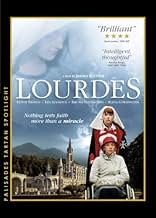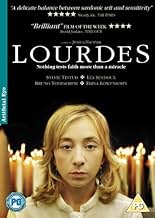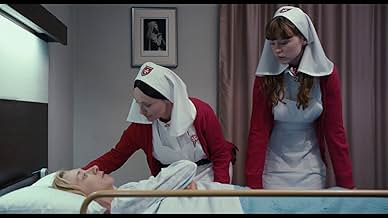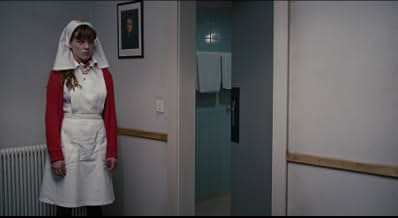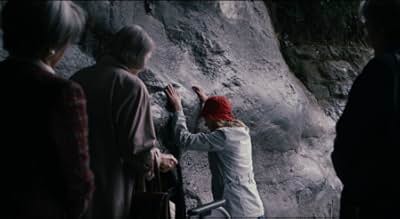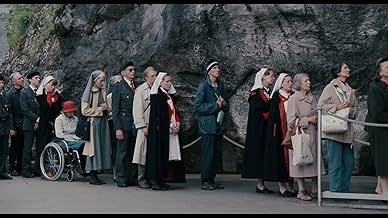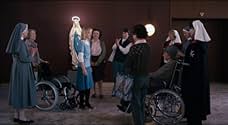CALIFICACIÓN DE IMDb
6.9/10
3.9 k
TU CALIFICACIÓN
Para escapar de su aislamiento, Christine, en silla de ruedas, emprende un viaje que le cambia la vida a Lourdes, el lugar emblemático de peregrinaje en los Pirineos.Para escapar de su aislamiento, Christine, en silla de ruedas, emprende un viaje que le cambia la vida a Lourdes, el lugar emblemático de peregrinaje en los Pirineos.Para escapar de su aislamiento, Christine, en silla de ruedas, emprende un viaje que le cambia la vida a Lourdes, el lugar emblemático de peregrinaje en los Pirineos.
- Premios
- 12 premios ganados y 7 nominaciones en total
Orsolya Tóth
- Child in Wheelchair
- (as Orsi Tóth)
Gerith Holzinger
- Malteserin
- (as Gerith Alice Holzinger)
- Dirección
- Guionista
- Todo el elenco y el equipo
- Producción, taquilla y más en IMDbPro
Opiniones destacadas
Kinda like reading "Magic Mtn"; a long, sometimes dull, but ultimately worthwhile tour through institutional hell, the institutions in question, medicine in the Mann novel and the church in Jessica Hausner's film, made all the more horrendous in that they masquerade as "healing". Film loses a bit of energy, though, to say nothing of credibility, once Christine experiences her temporary "cure". At that point Hausner abandons her heretofore effective tone of serio comic reality for one of allegory and kind of allows her hatred of humanity to overwhelm her. Still, a most impressive film from a director whose work has up to now been unknown to me and whose other movies I will assiduously seek. Give it a B plus.
The photography and mise-en-scene are great but the characters lack depth (Testud's room mate for example), the acting is great considering what the skinny script offers them (Testud and Seydoux are remarkables) but lots of subplots are left unexploited
I didn't think the film was that rewarding, it drags a bit towards the end, and the film feels a bit pointless sometimes
The film doesn't know if it should be Christian, critical or ironic, the best parts are when the it's unjudgemenal and contemplative
In the end I don't think Catholics or Agnostics would really like that film very much, it's got a strong sense of aesthetics but lacks personality and determination
I didn't think the film was that rewarding, it drags a bit towards the end, and the film feels a bit pointless sometimes
The film doesn't know if it should be Christian, critical or ironic, the best parts are when the it's unjudgemenal and contemplative
In the end I don't think Catholics or Agnostics would really like that film very much, it's got a strong sense of aesthetics but lacks personality and determination
Forgive my ignorance of neither Lourdes or theology, without a Catholic background, to me the miracles sound hyperbolic and outlandish at first, but after watching the film, even though being an agnostic, some kind of insight surfaced upon my mind's eye that the miracle itself could be a fatal burden to whom it is granted, which is my very direct response, which I am not sure would be the prime aim of the director, for me, it does pique my curiosity definitely.
Due to the fact that the mystery has still been in a moot beyond any explanation by now, the third feature from Austrian director Jessica Hausner (whose previous film is a haunting ghost story - HOTEL 2004) cannily digresses the mythological topic of the epiphanic moment, instead, the film focuses directly on the individuals of the pilgrim group (thought from a restrained distance), the most noteworthy comes from their blunt reactions before/after the miraculous event, which unavoidably compass piety, expectation, sympathy versus selfishness, jealousy, gloating, envy and bitterness. As a matter of fact it is more like a discreet dissertation on a test of humanity, which literally and cruelly reveals the inconvenient truth that it is our soul needs to be cured.
What I truly commend here is the laconic shots, the full-blown palette and a calm stance which is pervasive throughout the entire movie,
all of which establish a sincere austerity and mercy to its views, plus the non-intrusion composition drastically enhances the solemnity and sacrality of its proposition
The female protagonist Sylvie Testud's performance is extraordinarily astute, despite of her word-deficient and gesture-limited role while the supporting group is also tellingly awesome, terse but impressive!
Due to the fact that the mystery has still been in a moot beyond any explanation by now, the third feature from Austrian director Jessica Hausner (whose previous film is a haunting ghost story - HOTEL 2004) cannily digresses the mythological topic of the epiphanic moment, instead, the film focuses directly on the individuals of the pilgrim group (thought from a restrained distance), the most noteworthy comes from their blunt reactions before/after the miraculous event, which unavoidably compass piety, expectation, sympathy versus selfishness, jealousy, gloating, envy and bitterness. As a matter of fact it is more like a discreet dissertation on a test of humanity, which literally and cruelly reveals the inconvenient truth that it is our soul needs to be cured.
What I truly commend here is the laconic shots, the full-blown palette and a calm stance which is pervasive throughout the entire movie,
all of which establish a sincere austerity and mercy to its views, plus the non-intrusion composition drastically enhances the solemnity and sacrality of its proposition
The female protagonist Sylvie Testud's performance is extraordinarily astute, despite of her word-deficient and gesture-limited role while the supporting group is also tellingly awesome, terse but impressive!
Pros:
1. Léa Seydoux (Maria), Sylvie Testud (Christine), and Elina Löwensohn (Cécile) give fantastically rich performances.
2. The film highlights how people will use faith differently. Whether it be as a hobby, as a way of coping, or as a way-of-life.
3. The cinematography is almost perfect. Everything from the lighting, the framing, and the long impactful shots are just incredible.
4. Cécile collapsing on the floor is legitimately heartbreaking as even though before she was mostly stern and stoic, it was obvious that she cared for the patients.
5. Christine finding the ability to walk again is genuinely uplifting, and her reaction really helps to ground the "miracle" as she milks the newly-found attention after being ignored for awhile. It also rams home the ending with blunt force.
Cons: 1. Some of the scenes last a little too long. 2. The audio, at times, is distractingly out-of-sync.
Cons: 1. Some of the scenes last a little too long. 2. The audio, at times, is distractingly out-of-sync.
A girl with MS can't move her body, except for the face muscles. She goes to Lourdes, the place of miracles. She's not just tired of her life, she's of course also envious about life of others.
Usually, it's obvious there on the screen you shall look. Not here. Long takes, many extras, everybody make their moves and everybody is interesting, although you may forget them for a while, watching others.
Quietly, so many believable emotions are to be found here. Jealousy, slight passion, hopes, disappointments. And after a while you're not watching, you're among these pilgrims, and although you've never been in this environment, you recognize everything. And Sylvie Testud is superb.
Usually, it's obvious there on the screen you shall look. Not here. Long takes, many extras, everybody make their moves and everybody is interesting, although you may forget them for a while, watching others.
Quietly, so many believable emotions are to be found here. Jealousy, slight passion, hopes, disappointments. And after a while you're not watching, you're among these pilgrims, and although you've never been in this environment, you recognize everything. And Sylvie Testud is superb.
¿Sabías que…?
- TriviaWhen the script for El milagro de Lourdes (2009) first landed on Sylvie Testud's desk, her initial reaction was that she didn't want to do anything that might involve her playing a nun or taking easy potshots at religion. She instantly changed her mind after reading the script.
- ConexionesFeatured in Women Make Film: A New Road Movie Through Cinema (2018)
Selecciones populares
Inicia sesión para calificar y agrega a la lista de videos para obtener recomendaciones personalizadas
- How long is Lourdes?Con tecnología de Alexa
Detalles
- Fecha de lanzamiento
- Países de origen
- Sitios oficiales
- Idioma
- También se conoce como
- Lourdes
- Locaciones de filmación
- Productoras
- Ver más créditos de la compañía en IMDbPro
Taquilla
- Presupuesto
- EUR 2,000,000 (estimado)
- Total a nivel mundial
- USD 2,947,270
- Tiempo de ejecución1 hora 36 minutos
- Color
- Mezcla de sonido
- Relación de aspecto
- 1.85 : 1
Contribuir a esta página
Sugiere una edición o agrega el contenido que falta

Principales brechas de datos
By what name was El milagro de Lourdes (2009) officially released in India in English?
Responda

